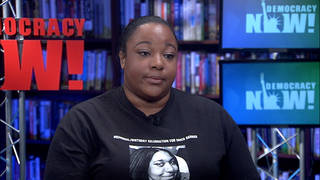
By Amy Goodman and Denis Moynihan
Erica Garner has died at the age of 27. The loss of this remarkable young African-American woman is incalculable. She was a tireless activist and a mother of two; her death was attributed to an asthma-induced heart attack four months after the birth of her second child, her son, Eric. Erica, like her son, was named after her father, Eric Garner, whose chokehold death at the hands of the New York Police Department on July 27, 2014, was captured on video and became a flashpoint in the fight against police brutality, further galvanizing the Black Lives Matter movement. Erica worked tirelessly for justice for her father.
“I can’t breathe.”
Those were the last words of Eric Garner, repeated 11 times on that July afternoon. Two weeks later, Michael Brown would be killed by a white police officer on the streets of Ferguson, Missouri. Protests were erupting all over the country. We flew back from Ferguson later that August, in order to cover a major march in Staten Island, with over 1,000 people demanding justice for Eric Garner, the prosecution of Daniel Pantaleo, the officer who was video-recorded by a bystander putting Garner in the chokehold, and an end to the NYPD’s systematic brutality that targets communities of color. We first met Erica Garner there, standing at the very spot where her father had been killed.
“My dad was a loving man, he was a humble man, and he was a nice man,” Erica told us. “You could never get a ‘no’ out of him. He did whatever he could for anybody who came around him. Anybody who came around him was touched by his graces. Seeing the videotape, I was very traumatized. I was very horrified. It was horrible. Just seeing my father die on national TV was just horrible. I’ve got to live with this forever.”
Erica was a loving daughter forced into the spotlight by tragedy. She led twice-weekly marches from the NYPD police precinct where her father’s killers still worked, to the site of his death. She spoke out against police brutality, appeared on panels and on television. Erica Garner, living in one of the roughest housing projects in New York City, became a powerful leader in the national movement to end police brutality.
She elaborated on the Democracy Now! news hour about the toll that a trauma like the killing of a father takes on a family. “When you deal with grief, when you talk about grief and you talk about how regular families deal with it, you know, families have problems, trouble coping with it.” She went on, “Mental health is very important. … For families that’s put in my position, black families that’s on public assistance, that doesn’t have the income to get therapy is $300 an hour, and I don’t think that’s fair, and it’s not made for the black population, because how are we supposed to cope with this if we don’t have someone to talk to, someone professionally to talk to?” She ended by saying, “I’m constantly reading articles and doing the research on my dad’s case. But I’m not taking care of me.”
Early in 2016, she endorsed Bernie Sanders for president, and appeared in a moving television ad: “This is everything I have, my family. Family should be important to everyone. Mostly I like being a mother,” Erica says. About her father, she says: “I’m just trying to get the truth out there, to tell his side of the story. He was being the loving, caring man that he was, and he was murdered.” Leaked emails later revealed that now-disgraced movie mogul Harvey Weinstein became alarmed at the power of the ad. Weinstein offered to help Hillary Clinton’s campaign manager Robby Mook to strategize on how to counter Erica’s message.
Erica’s power was speaking from her own experience. She even considered running for Congress. While New York City finally paid Eric Garner’s family a settlement, Erica continued to fight for the release of the full disciplinary records of Officer Pantaleo, who remains on the New York police force. And to her last breath, Erica also fought for federal civil-rights charges to be brought against Pantaleo and the officers who killed her father.
In her Bernie Sanders ad, Erica said, “I’m never giving up, I’m never going to forget, and I don’t want the world to forget what happened to my dad.” Now the onus is on all of us never to forget the passion, the commitment, the life, of Erica Garner.











Media Options